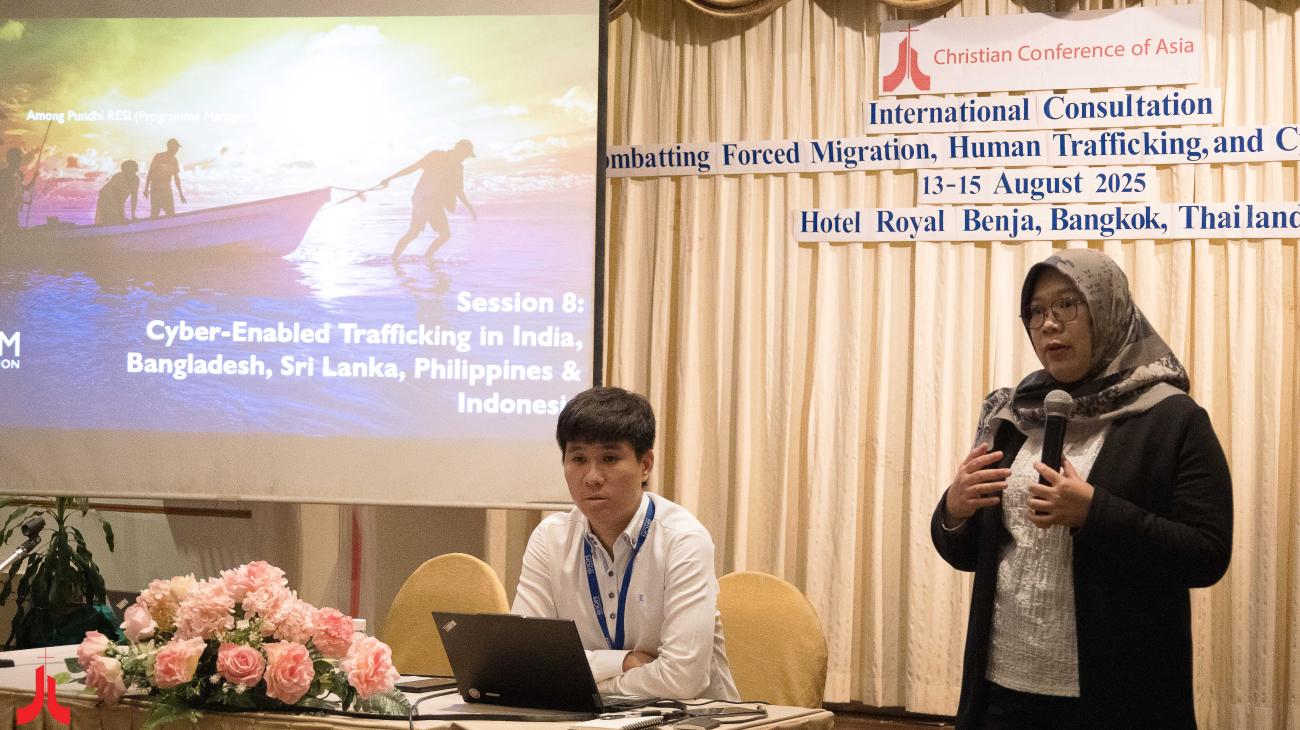Experts highlight critical role of Faith-Based Organisations in combatting human trafficking and cybercrime at CCA’s international consultation

Mr Thawatchai Khanawiwat and Ms Among Pundhi Resi from the International Organization for Migration (IOM)
Bangkok, Thailand: Experts working with United Nations agencies and international non-governmental organisations highlighted evolving trends in human trafficking, forced migration in Asia, and legal protection mechanisms to combat cybercrimes on the second day of the International Consultation organised by the Christian Conference of Asia (CCA).
The sessions on “Bordered and Broken: Case Studies on Forced Migration and Human Trafficking” and “Behind the Screens: Case Studies on Trafficking in Persons and Cyber Scams” were led by Among Pundhi Resi and Thawatchai Khanawiwat of the International Organization for Migration (IOM) .
Among Pundhi Resi, who oversees an initiative on protection, counter-trafficking, and border governance across Southeast Asia, shared insights from her extensive experience in dealing with the cases of vulnerable migrants and victims of trafficking, including return and reintegration assistance. Thawatchai Khanawiwat highlighted case studies and data on evolving trafficking trends affecting both Thai and foreign nationals.
Ms Resi highlighted regional trends in trafficking, including sexual exploitation, forced labour, forced criminality, forced marriage, and forced surrogacy. She emphasised the need to strengthen bilateral agreements, enhance referral mechanisms, and expand joint law enforcement efforts, and called for innovative, technology-driven approaches to combat trafficking facilitated or enabled by digital platforms.
Persistent challenges remain, including political dynamics, corruption, limited law enforcement capacity, and insufficient cross-border cooperation. The importance of vulnerability screening, standardised victim identification, and community-based interventions was also highlighted.
Ms Resi and Mr Khanawiwat underscored the critical role of faith-based organisations in providing immediate emergency support, assisting in the repatriation of victims, and contributing to broader anti-trafficking efforts.
William Gois, Regional Coordinator of Migrant Forum in Asia, examined the socio-economic drivers behind trafficking and forced migration, highlighting how digital transitions have enabled new forms of exploitation.
Mr Gois outlined key factors including economic inequality between countries, development policies prioritising profit over people, migration as a means to address poverty and unemployment, and labour demands in destination countries.
He concluded with a call for churches to consider their prophetic, pastoral, and ecclesiastical role in responding to these crises, posing the challenge: can churches offer sanctuary and become “sanctuary churches” for those affected by trafficking?
The session on “Legal Protection Mechanisms to Combat Trafficking in Persons and Forced Migration” was led by Christina Papazoglou, a legal and protection expert with nearly two decades of experience in human rights and humanitarian law, refugee protection, and legal frameworks addressing forced displacement and exploitation.
“Trafficking in persons and forced migration are symptoms of deeper structural inequalities, legal gaps, and governance failures. While international and regional legal frameworks offer foundational tools, they are not enough. Their impact is constrained by fragmented implementation and political hesitation,” Ms Papazoglou stated.
She highlighted several key measures to strengthen legal protection for trafficking victims and forced migrants. These include empowering civil society and survivor-led organisations, including faith-based organisations, to play an active role in policy design, monitoring, and service provision; strengthening regional cooperation through data sharing, joint investigations, and harmonised legal definitions; and developing robust referral mechanisms for victims.
Ms Papazoglou also stressed the importance of standardised, rights-based, and culturally sensitive victim identification and screening at borders and detention centres.
The Biblical-theological Reflection on Migration and Trafficking, led by Rev. Prof. Dr P. G. George, former Director of the South Asia Theological Research Institute of the Senate of Serampore College in Kolkata, India, provided the theological undergirding to the overall thematic focus of the consultation. While introducing several models and instances from Biblical narratives, he emphasised the ethical and humanitarian responsibilities of Christian communities to stand in solidarity with victims of trafficking and forced migration, based on the faith and witness of the Church and its ministry of pastoral accompaniment during times of victims’ vulnerability.
The international consultation being held in Bangkok will end on 15 August 2025.











